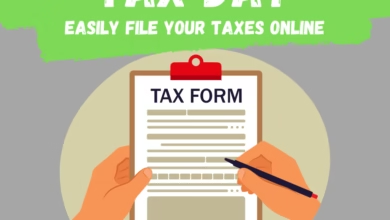
Navigating tax season can feel overwhelming, but with the proper knowledge and preparation, you can save money and even maximize your tax refund. Whether you’re a first-time filer or a seasoned taxpayer, understanding key tax tips can make a significant difference in your finances. From identifying eligible deductions to avoiding common mistakes, this guide will help you take complete control of your taxes in 2025.
This article will cover the most effective strategies to reduce taxable income, claim valuable credits, and ensure you get every penny you deserve. By the end, you’ll feel more confident about filing your taxes and have actionable insights to improve your financial planning for the years ahead. Let’s dive in!
Why Understanding Tax Tips is Crucial
Every year, taxpayers leave billions of dollars on the table simply because they’re unaware of available deductions, credits, or tax strategies. Proper tax planning allows you to:
Reduce taxable income, meaning you owe less to the government.
Maximize your refund, putting more money back into your pocket.
Avoid penalties and audits, ensuring your filing is error-free.
Tax laws and regulations change annually, so staying informed about the latest updates is essential for financial success.
Tax Deductions You Should Know About
Deductions can significantly lower your taxable income. Here are some of the most valuable ones:
Standard Deductions vs. Itemized Deductions
Standard Deduction: Most taxpayers qualify for a standard deduction, which 2025 will be $13,850 for single filers and $27,700 for married couples filing jointly.
Itemized Deductions: If your deductible expenses exceed the standard deduction, itemizing may save you more. Common itemized deductions include:
Mortgage interest
State and local taxes (SALT)
Charitable contributions
Home Office Tax Deduction
You may qualify for a home office deduction if you work from home. This allows you to deduct expenses such as utilities, internet, and office supplies, but only for the portion of your home used exclusively for work.
Medical Expenses
You can deduct unreimbursed medical expenses that exceed 7.5% of your adjusted gross income (AGI). Keep receipts for doctor visits, prescriptions, and other health-related costs.
To learn more about deductions available to individual taxpayers, you can visit the IRS page on tax credits and deductions.
Maximizing Your Tax Refund
To get the most significant refund possible, follow these strategies:
Claim Tax Credits
Unlike deductions, which reduce taxable income, credits directly lower the tax you owe. Here are some key credits to consider:
Earned Income Tax Credit (EITC): Designed for low- to moderate-income earners, this credit can provide substantial savings.
Child Tax Credit: If you have children under 17, you can claim up to $2,000 per child.
Education Credits: The American Opportunity Tax Credit (AOTC) and the Lifetime Learning Credit (LLC) help cover education expenses.
When discussing tax credits or tools like TurboTax, add external links to these tools.
Example: Tools like TurboTax can simplify the filing process and help identify valuable deductions and credits.
Contribute to Retirement Accounts
Contributions to retirement accounts like a 401(k) or IRA can reduce your taxable income. For 2025, the contribution limit for 401(k) plans is $23,000 if you’re under 50 and $30,500 if you’re 50 or older.
Use Tax Software or Hire a Professional?
Investing in tax software can simplify the filing process, but hiring a professional may be worth it if your taxes are complex. A tax preparer can identify deductions or credits you might miss.
Common Tax Mistakes to Avoid
Many taxpayers make errors that cost them money or trigger audits. Here’s how to avoid them:
Filing Late: The deadline to file taxes for 2025 is April 15. Filing after this date may result in penalties.
Mathematical Errors: Double-check all calculations if you’re filing manually. Better yet, use tax software for accuracy.
Ignoring Taxable Income: Freelancers and gig workers must remember to report all income, such as side jobs or tips.
Missing Deductions or Credits: Always review potential deductions and credits before filing.
Link to resources that explain common errors and how to avoid them.
Example: For a complete list of common tax mistakes to avoid, refer to this Investopedia guide.
Filing Deadlines and Penalties
Please complete key deadlines to avoid fines or penalties. Here are the important dates for 2025:
January 15: Deadline to pay the fourth installment of estimated taxes.
April 15: Deadline to file your 2023 federal tax return.
October 15: Extended deadline if you file for an extension.
If you miss the filing deadline without an extension, you may face a failure-to-file penalty of 5% of unpaid monthly taxes, up to 25%.
Conclusion: Start Planning Early
Tax season doesn’t have to be stressful. You can save money and maximize your refund by understanding your deductions, taking advantage of credits, and avoiding common mistakes. Remember, preparation is key. Start organizing your documents early, and don’t hesitate to seek professional help.
With the right strategies in place, 2025 can be the year you master your taxes and take control of your financial future.
Call-to-Action
Have more tax-related questions? Explore our blog for in-depth guides and expert tips to make smarter financial decisions!
FAQs
1. What is the difference between a tax deduction and a tax credit?
A tax deduction reduces your taxable income, lowering the income subject to taxes. For example, a $1,000 deduction lowers your taxable income by $1,000.
A tax credit, on the other hand, directly reduces the taxes you owe. For example, a $1,000 tax credit lowers your bill by $1,000. Credits generally offer more significant savings than deductions.
—
2. Who qualifies for the Earned Income Tax Credit (EITC)?
The EITC is available to low- and moderate-income workers. Eligibility depends on your income, filing status, and the number of dependents. For example, in 2025, single filers with no dependents must earn less than $17,640 to qualify, while those with three or more dependents can earn up to $57,480.
—
3. Can I deduct student loan interest?
You can deduct up to $2,500 in student loan interest paid during the tax year. This deduction is available even if you don’t itemize, but income limits apply. For 2025, the deduction phases out for single filers earning more than $85,000 or joint filers earning more than $170,000.
—
4. How do I claim a home office deduction?
If you’re self-employed or a freelancer and use a portion of your home exclusively for work, you may qualify for a home office deduction. You can use one of two methods:
Simplified Method: Deduct $5 per square foot of office space, up to 300 square feet.
Regular Method: Deduct actual expenses like rent, utilities, and maintenance, prorated for the size of your office.
“Want to learn more about improving your financial situation? Check out our next article on smart financial planning tips!”
5. What are the penalties for filing taxes late?
If you miss the filing deadline without an extension, the failure-to-file penalty is 5% of your monthly unpaid taxes, up to a maximum of 25%. If you owe taxes, the failure-to-pay penalty is 0.5% of unpaid monthly taxes, up to 25%. To avoid these penalties, file on time, even if you can’t pay your taxes immediately.
—
6. Should I itemize deductions or take the standard deduction?
You should itemize if your deductible expenses (e.g., mortgage interest, medical expenses, charitable contributions) exceed the standard deduction. For 2025, the standard deduction is:
$13,850 for single filers
$27,700 for married couples filing jointly
If your total expenses don’t exceed these amounts, the standard deduction is a more straightforward and more beneficial choice.
—
7. Can I file my taxes for free?
If your income is below a certain threshold (typically $73,000 in 2023), you may qualify for free filing through the IRS Free File program or tax software like TurboTax and H&R Block. Many of these tools guide you step-by-step to ensure accuracy.
—
8. Is my tax refund taxable?
In most cases, your federal tax refund is not taxable. However, that refund might be taxable if you received a state or local tax refund and claimed a deduction for those taxes in a previous year.
—
9. How long should I keep my tax records?
The IRS recommends keeping tax records for at least three years after filing. If you file a claim for a loss or credit, keep the records for seven years. For significant transactions like buying a home, keep documents indefinitely.
—
10. How do I avoid a tax audit?
To reduce the risk of an audit:
- File accurate and honest returns.
- Avoid claiming deductions or credits you’re not eligible for.
- Double-check your math and documentation.
- Be cautious with substantial deductions compared to your income level.
—
For more tax tips and up-to-date information, visit the IRS official website.



2 Comments